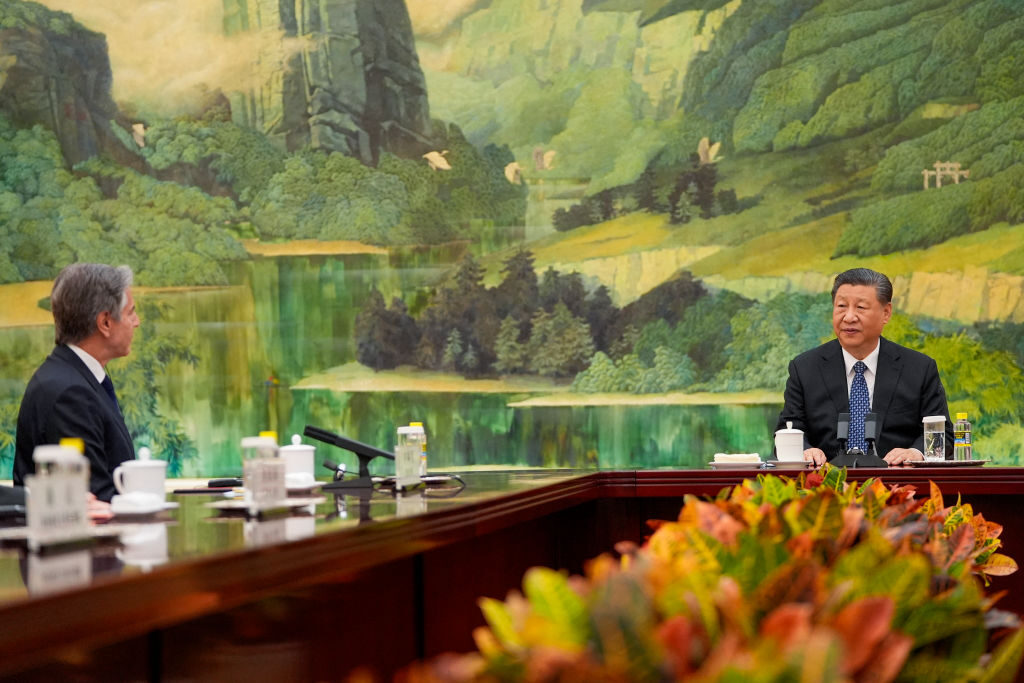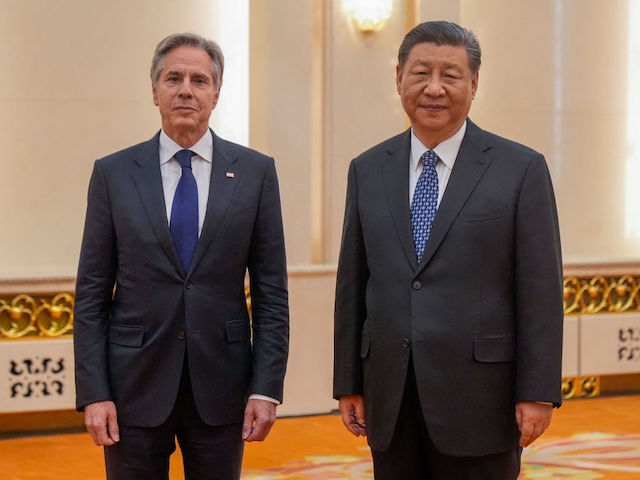Secretary of State Antony Blinken met genocidal Chinese dictator Xi Jinping in Beijing on Friday, reportedly receiving stern warnings to “seek common ground” with his violent regime and avoid “vicious competition.”
Blinken also met with his counterpart, Foreign Minister Wang Yi, who complained that “China’s legitimate development rights have been unreasonably suppressed and our core interests are facing challenges” thanks to the international community objecting to China’s rampant human rights abuses, violations of basic trade practices, and routine disrespect for the sovereignty of other countries, including America.
America’s top diplomat is concluding a three-day visit to China that began in Shanghai on Wednesday, where he landed with no high-ranking officials there to greet him, no red carpet, and little hospitality.

China’s President Xi Jinping (R) speaks with U.S. Secretary of State Antony Blinken during their meeting at the Great Hall of the People in Beijing on April 26, 2024. (MARK SCHIEFELBEIN/POOL/AFP via Getty)
Blinken spent much of Thursday meeting with local Communist Party officials, businessmen, and students in Shanghai, promoting an expansion of ties with the rogue communist regime.
🔹Blinken has arrived in Shanghai, China🇳.
🔹Many people noticed when he stepped off the plane, there seemed to be no red carpet on the ground.
🔹His China visit should be seen as an “imploring” one, although the US made some tough public opinion preparations in advance. pic.twitter.com/t0KFXH8vnj
— Hu Xijin 胡锡进 (@HuXijin_GT) April 24, 2024
In his meeting with Xi on Friday, the dictator reportedly scolded Blinken that America should not “say one thing and do another” in its dealings with Beijing, according to the South China Morning Post.
President Xi Jinping met with US Secretary of State Antony Blinken @SecBlinken.
Over the past 45 years, the China-US relationship has gone through winds and rains, and it has a number of important inspirations to offer: China and the US should be partners rather than rivals;… pic.twitter.com/PRDCpBpf16
— Hua Chunying 华春莹 (@SpokespersonCHN) April 26, 2024
“[The two countries] should achieve mutual success, not harm each other; they should seek common ground while reserving differences instead of vicious competition;” Xi reportedly said, “they should be true to their words and be resolute in deeds, rather than saying one thing and doing another.”
“I have said many times that the Earth is big enough for China and the United States to develop together and prosper independently. China would like to see a confident, open, prosperous and developing United States,” Xi claimed. “We hope that the United States can also take a positive view of China’s development.”
President Xi Jinping noted that Planet Earth is only this big, and humanity is faced with so many common challenges.
As an old Chinese saying goes, “Passengers in the same boat should help each other.” Today, dwellers of the same planet should help each other. pic.twitter.com/EqalnVOQcX
— Hua Chunying 华春莹 (@SpokespersonCHN) April 26, 2024
The Chinese state Xinhua News Agency paraphrased Xi stating that America and China had a mutual responsibility to “set a good example of how major countries are supposed to act.”
The State Department published a transcript of Foreign Minister Wang Yi’s remarks prior to his private meeting with Blinken on Friday in which he made multiple demands of the administration of leftist President Joe Biden, citing “red lines” in Chinese policy, presumably referring to China’s false claim to ownership of the sovereign nation of Taiwan.
I had an in-depth and substantive meeting today with People’s Republic of China Director Wang Yi. As part of our effort to responsibly manage competition, we discussed areas of difference, in addition to areas of shared interest — like counternarcotics — where we can build on… pic.twitter.com/uGkTh6FPqz
— Secretary Antony Blinken (@SecBlinken) April 26, 2024
“China’s legitimate development rights have been unreasonably suppressed and our core interests are facing challenges,” Wang objected.
“China’s concerns are consistent. We have always called for respect of each other’s core interests and urge the United States not to interfere in China’s internal affairs,” Wang continued, “not to hold China’s development back, and not to step on China’s red lines on China’s sovereignty, security, and development interests.”
China typically uses “internal affairs” to refer to the human rights atrocities the Communist Party regularly commits against its own people and those of occupied territories. On Monday, the State Department published its annual human rights reports for all countries of the world, issuing a scathing assessment of the abuses by Chinese state throughout 2023. Paramount among these is the ongoing genocide of Uyghur, Kyrgyz, Kazakh, and other people in occupied East Turkistan, where China has established concentration camps, executed mass sterilization campaigns, and enslaved a substantive percentage of the population. Significant evidence indicates that the Chinese government is also involved in the illicit organ harvesting trade, killing people to sell their organs in the region.
In his statements to the press alongside Wang, Blinken focused instead of touting the alleged importance of “active diplomacy” – meaning face-to-face discussions with other diplomats for their own sake rather than with any clear goal established – and listed several goals for his visit, including “strengthen[ing] our people-to-people connections” and collaborating on the development of artificial intelligence.
“I underscore again it’s important … to demonstrate that we’re managing responsibly the most consequential relationship, I think for both of us, in the world,” Blinken emphasized. “I hope we can make some progress on the issues that our presidents agreed we should cooperate on, but also clarify our differences, our intent, and make very clear to each other where we stand.”
According to Xinhua, Wang and Blinken agreed on five vague goals for the short-term relationship between Washington and Beijing.
China, U.S. reach five-point consensus at Beijing meeting https://t.co/rmRhf2jd6Y pic.twitter.com/Kq6vqzQG3S
— China Xinhua News (@XHNews) April 26, 2024
“First, both sides agreed to continue to work hard to stabilize and develop China-U.S. relations,” Xinhua listed. “Second, both sides agreed to maintain high-level exchanges and contacts at all levels.”
The other three goals were holding an “intergovernmental dialogue on artificial intelligence,” expanding “cultural” ties with the Chinese Communist Party, and “maintain[ing] consultations on international and regional hotspot issues.”
The State Department readout of Blinken’s meeting with Yi claimed that the two discussed “concerns about PRC support to the Russian defense industrial base, the importance of maintaining peace and stability in the Taiwan Strait, PRC activities in the South China Sea, and the need to avoid further escalation in the Middle East and on the Korean Peninsula.”
Many of the human rights issues present in the State Department report published Monday – notably the ongoing Uyghur genocide – did not appear in the readout. It did conclude: “The Secretary emphasized that the U.S. will continue to stand up for our interests and values and those of our allies and partners, including on human rights and economic issues.”

COMMENTS
Please let us know if you're having issues with commenting.